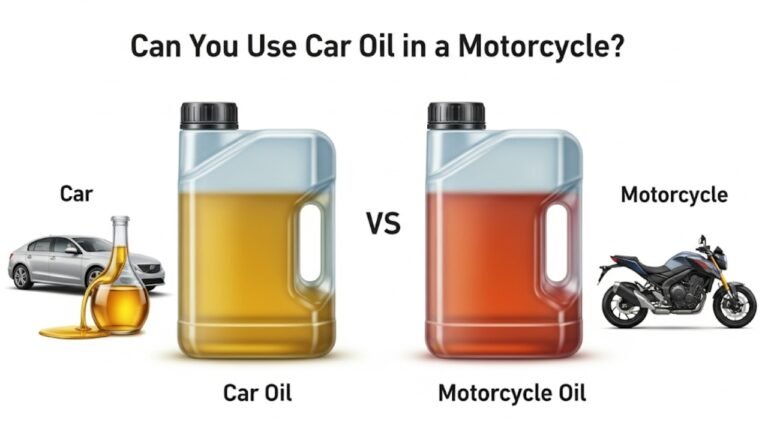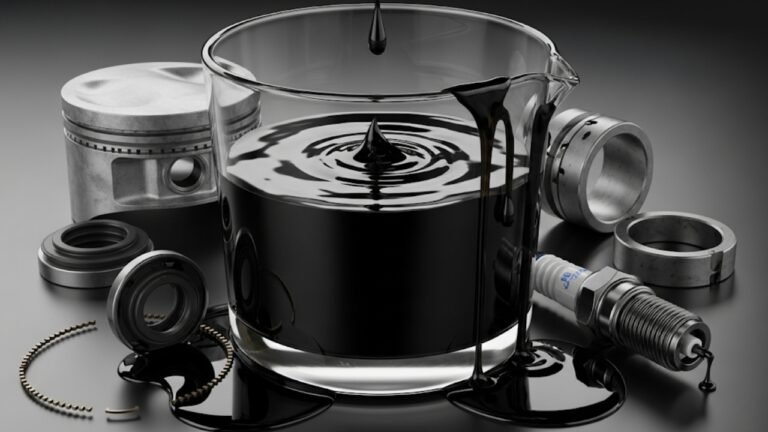What Oil Does My Car Need UK? – A Friendly Guide

We’ve all been there. Standing in a car parts shop or scrolling through Amazon, overwhelmed by bottles labelled 5W-30, 10W-40, fully synthetic, semi-synthetic… wondering what oil does my car need UK?
Honestly, I remember my first oil change. I was clutching the handbook like it was a life raft. My fingers were greasy, my shirt had a mysterious stain, and I couldn’t tell the difference between a torque wrench and a toothbrush. The biggest question in my head was the same as yours now: “What if I pick the wrong oil?”
That moment stayed with me. Because picking the wrong oil can affect your car’s performance. But it doesn’t have to be confusing.
So, let’s walk through this together. Like mates having a chat over coffee. No jargon. Just clear answers and practical advice – with a sprinkle of humour and realness.
Why the Right Oil Matters More Than You Think
Choosing the correct engine oil is like picking the right blood type for your body. It’s not just about keeping things smooth – it’s vital.
In the UK, where the weather swings from freezing mornings to scorching summers (well, sometimes), your car needs oil that adapts. The wrong oil might still run your engine, but it won’t protect it properly. Over time, that means more wear, more repairs, and less efficiency.
Let me break it down:
-
The wrong viscosity means the oil won’t flow right in cold or hot weather.
-
Too thick? It strains the engine.
-
Too thin? It won’t coat moving parts enough.
-
Wrong specifications? You might void your warranty or risk engine damage.
When asking what oil does my car need UK, you’re not being fussy – you’re being smart.
Understanding Engine Oil: What Do the Numbers Mean?
Let’s take a look at oil labels like 5W-30. At first glance, they look like algebra. But I promise, it’s not that deep.
-
5W – The “W” stands for winter. This number shows how well the oil flows in cold temperatures.
-
30 – This is the oil’s viscosity (thickness) at higher, engine-running temperatures.
Example Table: Common Oil Types and Usage
| Oil Type | Cold Start (W) | High Temp (Viscosity) | Best For |
|---|---|---|---|
| 0W-20 | Very good | Very thin | Newer cars, cold climates |
| 5W-30 | Good | Balanced | Most petrol and diesel cars |
| 10W-40 | Moderate | Thicker | Older engines, high mileage |
Your car’s manual will suggest what viscosity you need. But oil choice also depends on UK climate, car mileage, and your driving style.
Where to Find the Right Oil Info for Your Car
Most people don’t know this, but your car manual is pure gold.
It tells you exactly which oil is recommended. There’s no guessing. The manufacturer has already tested and picked the best type for your engine. Trust it.
Look For:
-
Viscosity rating (e.g. 5W-30)
-
Oil specification codes (e.g. ACEA A5/B5, VW 504 00, Ford WSS-M2C913-D)
-
If you’ve lost the manual? No worries. Most UK auto sites (like Halfords or Euro Car Parts) let you enter your reg number to see compatible oils.
I once used this to help my neighbour after he accidentally poured gearbox oil into the engine. (True story. We laugh about it now.)
Types of Engine Oil in the UK Market
Now, let’s talk about the types of oils you’ll find on the shelves. Not all oils are created equal.
1. Fully Synthetic Oil
-
Best protection and performance.
-
Great for modern engines and longer oil change intervals.
-
More expensive, but worth it.
2. Semi-Synthetic Oil
-
A mix of synthetic and mineral oils.
-
Good balance for everyday use.
-
Cheaper than fully synthetic.
3. Mineral Oil
-
Old-school and basic.
-
Suitable for older cars with simple engines.
-
Needs frequent changes.
If your car is under 15 years old, chances are it needs fully synthetic or semi-synthetic.
So, the answer to what oil does my car need UK depends on both what the manual says and how you drive. If you mostly do short trips around town, you might want a lighter oil. But if you’re on the motorway every day, high-performance oil pays off.
Why UK Weather Affects Your Oil Choice
Here’s something most people overlook: climate.
The UK may not be as extreme as Canada or Dubai, but our cold winters and damp weather do play a role.
In winter, your engine needs oil that flows fast when it’s cold. That’s why low ‘W’ numbers like 0W or 5W are good.
In summer, especially with longer drives, you want oil that doesn’t thin out too much under heat. That’s where the second number (like 30 or 40) matters.
So, a 5W-30 oil is often a safe all-rounder in the UK. But again – check your handbook first.
How to Check What Oil is Already in Your Car
Maybe you’re not sure what oil was used last time. Or your garage didn’t leave a note.
Here’s what you can do:
-
Check the service records – If you have them, see if the oil type was listed.
-
Call your garage – Most will tell you what they used.
-
Look at the oil bottle in your boot (if you keep one for top-ups).
If you still can’t figure it out, it’s best to do a full oil change with a known, correct oil type. Mixing oils isn’t usually harmful once, but it’s not ideal either.
Common Mistakes to Avoid When Choosing Oil
Here’s the honest truth: I’ve made a few of these myself.
Don’t:
-
Just grab any oil from the shelf because it’s cheap.
-
Assume all 5W-30 oils are the same – they’re not!
-
Forget to check the spec codes like ACEA or manufacturer approvals.
-
Ignore oil change intervals – oil degrades over time, even if your car “feels fine.”
Do:
-
Always check the manual or reg number.
-
Stick to reputable oil brands.
-
Keep a small bottle of the correct oil in your car for top-ups.
Trust me – doing it right the first time saves you from headaches later.
My Favourite Oils I’ve Used in the UK (From Real Experience)
Over the years, I’ve tried quite a few brands in my own cars and family vehicles.
Here’s what I’ve personally found great:
-
Castrol EDGE 5W-30 LL – Used it in my Audi A3. Smooth engine, great fuel economy.
-
Shell Helix Ultra 5W-40 – Perfect for my brother’s Vauxhall Insignia. Ran cooler in summer.
-
Mobil 1 ESP 0W-30 – I once used this in winter. Cold starts were buttery smooth.
Again, the key is matching the right oil to your car’s specs – not just the brand.
How to Change Engine Oil at Home (The UK Way)
Changing your oil at home isn’t just for car enthusiasts. If you’re willing to get your hands a bit dirty, you can save money and get that satisfying feeling of doing it yourself.
Here’s a simplified UK-style guide for changing your engine oil:
Tools & Supplies You’ll Need:
-
Correct engine oil (check manual)
-
New oil filter
-
Oil filter wrench
-
Socket set
-
Oil drain pan
-
Funnel
-
Disposable gloves
-
Old rags or newspaper
-
Jack and axle stands (or ramps)
-
A safe, flat area to work
Step-by-Step:
-
Warm up the engine slightly so the oil flows out more easily.
-
Raise the car using a jack and secure it.
-
Place your drain pan under the oil sump.
-
Unscrew the drain plug with your socket. Let the oil fully drain (takes ~10 mins).
-
Remove the old oil filter with the wrench.
-
Apply a dab of new oil to the new filter’s gasket and screw it on.
-
Replace the drain plug tightly but don’t overtighten.
-
Use the funnel to pour in the new oil – start with ¾ of the total capacity.
-
Start the engine for 30 seconds, then turn it off.
-
Check the dipstick and top up as needed.
Dispose of old oil responsibly. Most UK councils have free oil disposal points or your local Halfords will accept it.
Doing this yourself is oddly therapeutic – like mowing the lawn. Once you get into the rhythm, it becomes second nature.
Best Places to Buy Engine Oil in the UK
There are loads of reliable options for buying car oil across the UK – both in-store and online.
Top Recommendations:
-
Halfords – Great for in-person help. Enter your reg on their site to find matching oils.
-
Euro Car Parts – Frequent sales, wide brand selection.
-
Amazon UK – Good for premium brands with Prime delivery.
-
Opie Oils – Niche but trusted by car lovers.
-
Local garages – Often stock manufacturer-approved oils at fair prices.
If you’re still wondering what oil does my car need UK, these platforms usually let you enter your registration number to match it with the correct products. It’s like Tinder, but for your car.
Frequently Asked Questions (FAQs)
1. What oil does my diesel car need in the UK?
Diesel engines often require oils with specific ACEA C ratings (e.g. C2 or C3). Most modern diesels in the UK use 5W-30 low-SAPS fully synthetic oil. Always check your handbook or use a reg lookup.
2. Can I use 5W-30 oil instead of 10W-40 in the UK?
If your manual allows it, yes. 5W-30 is better for cold starts and fuel efficiency. But never guess—stick to your car’s approved viscosity and specifications.
3. Is synthetic oil better for UK driving conditions?
Yes. Fully synthetic oil resists breakdown better in both cold winters and long summer drives. It’s ideal for stop-start traffic common in UK cities.
4. How often should I change oil in the UK?
Every 6,000 to 10,000 miles, or once a year—whichever comes first. Some modern cars go up to 15,000 miles, but regular checks are key.
5. What happens if I use the wrong oil in my car?
It can cause:
-
Poor fuel economy
-
Engine knocking
-
Faster wear on internal parts
-
Even potential long-term damage
If you’re unsure, a full oil change with the correct oil is the safest option.
6. Do older UK cars need different oil?
Yes. Older engines (pre-2000s) may need 10W-40 or even mineral oils. These engines don’t perform well with modern low-viscosity oils.
7. How can I tell if my oil needs changing?
Watch for signs like:
-
Engine noise
-
Oil warning light
-
Sluggish acceleration
-
Black, thick oil on the dipstick
If in doubt, do a quick check and top-up or change.
8. Does car warranty depend on using the correct oil?
Absolutely. Most warranties require proof that you’ve used manufacturer-approved oils. Keep receipts and service records.
Final Tips & Takeaways
Let’s wrap up what we’ve learned about what oil does my car need UK with some real, practical advice.
What to Remember:
-
Always check your car manual or use a reg number tool.
-
5W-30 fully synthetic is the most common type, but not one-size-fits-all.
-
Look for ACEA, API, or OEM specifications on the bottle.
-
Consider climate and driving habits.
-
Don’t mix oils unless it’s an emergency top-up.
-
Changing oil at home saves money – just dispose of it safely.
-
Buy from reputable UK sellers who allow reg number matching.
Summary: Treat Your Car Like It’s Part of the Family
Choosing the right oil is like choosing the right food. Feed your car what it was designed for, and it will take care of you for years. You wouldn’t pour vegetable oil into a kettle, right? (Well… hopefully.)
So next time you’re in Halfords or browsing online, take a breath. With everything you’ve just read, you’re now miles ahead of the average driver. You know what oil does my car need UK, and how to find it, change it, and buy it.
You’ve got this.
And if you’re ever unsure, just imagine us having this chat again – because good advice is always worth repeating.






